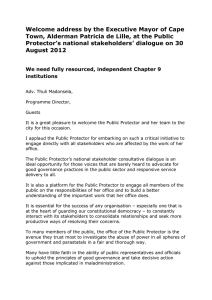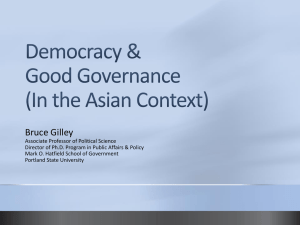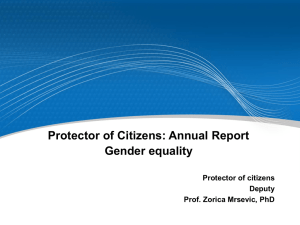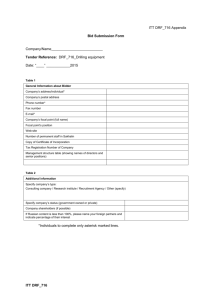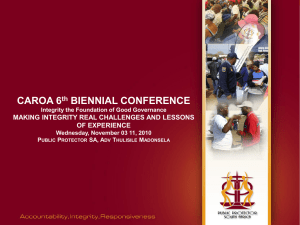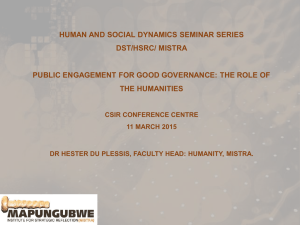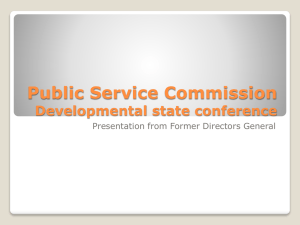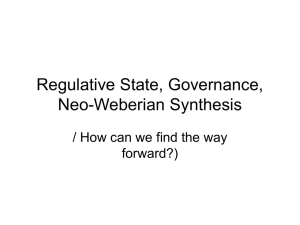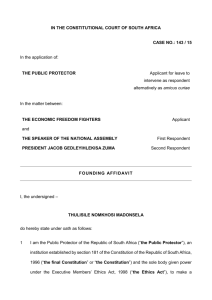Public Protector striving to make fulfilment of human rights a reality
advertisement
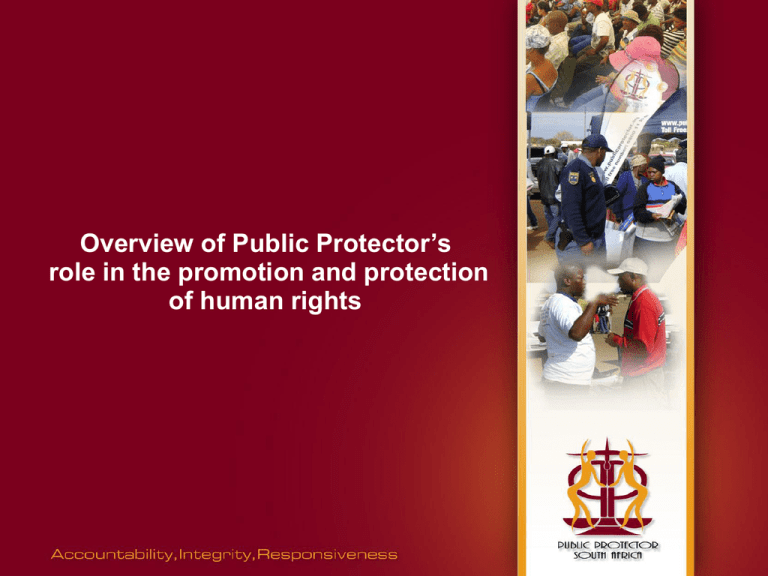
Overview of Public Protector’s role in the promotion and protection of human rights 10/12/17 INTRODUCTION The Public Protector strives to make constitutional democracy and the fulfilment of human rights a reality to South Africans from all levels through the improvement of national governance Human rights are more than the proclamation of splendid international instruments and indulgence in fine rhetoric. Good governance and institutional reform within each nation are vital to the effective delivery of human rights. The Hon Justice Michael Kirby AC CMG Governance is the process whereby public institutions can conduct public affairs, manage public resources and guarantee the realisation of human rights. The true test of "good" governance is the degree to which it delivers on the promise of human rights United Nations High Commissioner for Human Rights, 2002 Recall the face of the poorest and weakest man whom you have seen, and ask yourself if the step you contemplate is going to be of any use to him… Will it restore him a control over his own life and destiny? In other words, will it lead to Swaraj for the hungry and spiritually starving millions? Then, you will find your doubts and your self-melting away. 10/12/17 Mohandas K. Gandhi International Human Rights standards One of principal purposes of the UN is the promotion and protection of human rights. It has set up “complex machinery” under various international covenants and conventions to establish standards, monitor implementation promote compliance and investigate violations of human rights The international systems rely heavily on the support from Click to edit Master subtitle style regional human rights systems supported by Governments and concerned NGO’s Each of these groups has a special role in the development of a universal culture of human rights and making such a culture a practical reality in the lives of ordinary citizens. 10/12/17 Establishment of National Human rights instruments When states ratify human rights instruments the universal human rights standards and norms find their expression in the domestic laws of the countries. However, the existence of laws is not enough if provision is not made for the necessary legal powers and institutions to ensure their effective realisation : “It has therefore become increasingly apparent that the effective Click of to edit Masterright subtitlecalls style for the establishment of national enjoyment human infrastructures for their protection and promotion. (Fact Sheet No.19, National Institutions for the Promotion and Protection of Human Rights) Majority of existing National instruments are Human Rights Commissioners and ombudsmen 10/12/17 The role of Human Rights Commissions and Ombudsmen in the protection and promotion of Human rights HRC’s primarily concerned with protection of nationals against discrimination and with the protection of civil and other human rights: • • Receives and investigate complaints and allegations of human rights abuses committed in violation of existing national laws, and Review the Government’s human rights policy in order to detect shortcomings Click to edit Master subtitle style Ombudsmen protect the rights of individuals who are the victims of improper and unjust acts on the part of state administration. Often acts as mediator between aggrieved individual and public institutions. Primary function to ensure fairness and legality in public administration. 10/12/17 The significance of establishing human right instruments in South Africa When formal apartheid ended in 1994, the newly elected democratic government undertook to redress past inequalities, inequities, injustices and oppression, amid high hopes and expectations from the public about the tangible benefits democracy would bring. A constitutional order based on the rule of law and the principle of the separation of powers and functions in the state and in government, with a human rights orientation, play a central Click roletoinedit South democracy MasterAfrica’s subtitle style Recognising that the task of promoting and protecting human rights cannot be left to the government or to the individual, it was agreed that institutions must be established that would advance democratic governance. The South African Constitution, which is considered one of the most progressive in the world, enshrines in Chapter 9 state institutions to protect constitutional democracy, each of them 10/12/17 with a specific mandate, including the Public Protector and the Public Protector’s Constitutional Mandate • • • The Public Protector(PP) is established under section 181 of the Constitution and is given power by 182 of the Constitution to strengthen and support constitutional democracy by investigating any conduct in state affairs, or in the public administration in any sphere of government, that is alleged or suspected to be improper or to result in any impropriety or prejudice; to report on that conduct; and to take appropriate remedial action Section 182(4) of the Constitution requires the Public Protector to be accessible to all persons and communities The PP is appointed by President for a 7 year non-renewable term following a 60% majority vote in Parliament 10/12/17 Vision A trusted, effective and accessible Public Protector that rights administrative wrongs and consistently acts with integrity to ensure fair, accountable and responsive decision-making, service and good governance in all state affairs and public administration in every sphere of government. • In practice this translates into a two pronged approach that involves promptly redressing individual administrative wrongs while facilitating systemic change to transform the character of the state by institutionalizing good governance Click to edit Master subtitle style 10/12/17 Mission To strengthen constitutional democracy in pursuit of our constitutional mandate by investigating, rectifying and redressing any improper or prejudicial conduct in state affairs and resolving related disputes through mediation, conciliation, negotiation and other measures to ensure fair, responsive and accountable public sector decision-making and service delivery. 10/12/17 Core Principles and Values Anchored on the supremacy of the Constitution and rule of law, basic values and principles governing public administration as envisaged in Chapter 10 of the Constitution, Batho Pele Principles and International Ombudsman Principles, the work of the Public Protector is informed by the core principles of: •Independence and Impartiality •Human Dignity •Equality; •Ubuntu; •Redress; •Accountability; 10/12/17 Core Principles and Values (cont.) • • • • Integrity; Responsiveness; Transparency; and Justice and Fairness 10/12/17 Mandate Implications of the promotion of human rights as the foundation of Good Governance • Public Protector’s relationship with the promotion and protection of human rights has a number of dimensions: – Reinforcing a strong tradition of civil society – Establishing respect of human rights – Important contributor to the maintenance of the rule of law – Part of the broader oversight framework of constitutional obligations, policy, legislation and administrative practices in the public administration 10/12/17 Giving the people of South Africa a voice Complaints of maladministration and human rights questions that arise daily, are of great consequences to many South Africans. Their quality of life and enjoyment of citizenship can hinge quite directly on how effectively these questions are resolved. The PP has an important role in remedying government’s administrative injustices or failures and reconciling the people with the state. People know and appreciate they have a protected right to complain against public institutions. “the right to complain, when securely embedded, is surely one of the most significant human rights activities that we can strive for”(Michelle Falardus-Ramsay – Canadian Human Rights Commissioner) PP deals with rights problems in all areas of government by means of complaint handling, own motion, and systemic investigations, as well as interaction with government agencies. 10/12/17 Giving the people of South Africa a voice (cont’d) While protection of individual rights are paramount, it is acknowledged that real rights protection for the community comes where there is systemic change. This is a role that an ombudsman institution such as the PP can undertake more effectively than the courts. Another technique for ensuring systemic change is own motion enquiries and reports. A great advantage that the PP has over courts and parliament is that she can follow up on complaints and report findings in a proactive manner and not merely reactive. The regular dialogue with the state can stimulate cultural change within government 10/12/17 Case studies 1. Individuals and communities from ten villages in Limpopo Province affected by the construction of the Nandoni Dam near Thohoyandou. The complaints primarily related to inadequate or lack of compensation for loss of the right to access to arable land, secure access to the river, compensation for domestic fruit trees, commercial fruit orchards or farms, relocation of graves, traditional medicinal plants, poorly constructed access roads, water supply, dam safety and other related matters Undue delays by the Department of Home Affairs in connection with the processing of applications for identity documents ICD fails to investigate allegations of police brutality (Current matter) Access to medical assistance for HIV positive mother and child – 2. 3. 4. 10/12/17 Feeling the change at “grass roots level” The PP has become increasingly streamlined in the past years in its operations and establishing a presence in all the provinces. The PP, Adv Madonsela has since her appointment been vigorously reaching out to all communities and individuals to explain her function and the concept and practice of human rights and good governance. The PP has also been very active in the field of good governance and human rights education with the staging of sensitization seminars, workshops, and functions: “No administrative wrong will go undetected and not remedied under our watch” 10/12/17 Case Initiation Who may initiate a case? A case may be initiated by any of the following: Public Protector Act and others 1)Member of the Public/Organisation 2)Members of Parliament; 3)Public Protector; 4)Organ of State/ Referral Body; Executive Members’ Ethics Act 1)President/Premier 2)Member of Parliament/Member of Provincial Legislature • 10/12/17 How do you initiate a case? A complaint may be lodged through any of the following: 1) Cal Toll-free line: 0800 11 20 40; 2) Visit any of the Public Protector. 19 exist across the country divided into : • National Office • 9 Provincial Offices • 9 Regional Offices 3) Participate in any outreach activity eg. Mobile office, clinics, TV or radio programmes 4) Write to the Public Protector 10/12/17 How do you initiate a case? (cont.) 5) Complete a form on the website: www.publicprotector.org 6) Send an email to regristration2@pprotect.org 10/12/17 Thank You 0800 11 20 40 www.publicprotector.org 10/12/17 10/12/17
